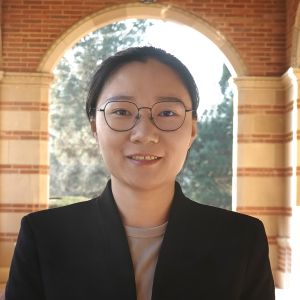Sponsored by Mercedes-Benz Research & Development North America
Congratulations to Seungju Yu, Seoul National University, and Xintong Yuan, University of California, Los Angeles, 2025 ECS Battery Division Student Research Award recipients. The award, established in 1979 and sponsored by Mercedes-Benz Research & Development North America since 2018, recognizes promising young electrochemical power source engineers and scientists and encourage them to initiate or continue careers in the field.
Nominations for the 2026 ECS Battery Division Student Research Award Sponsored by Mercedes-Benz Research & Development open on October 15, 2025. Learn more!
Seungju Yu
 Seungju Yu received the award for his contributions to lithium-ion batteries through insights into lithium diffusion in halide solid electrolytes and degradation mechanisms in lithium-rich layered oxides, enhancing safety and energy density, and establishing new design strategies for future energy materials. He delivers his award talk, “Unveiling Lithium Superionic Conduction in Halide Solid Electrolytes,” at the at the 248th ECS Meeting on Wednesday, October 15, 2025.
Seungju Yu received the award for his contributions to lithium-ion batteries through insights into lithium diffusion in halide solid electrolytes and degradation mechanisms in lithium-rich layered oxides, enhancing safety and energy density, and establishing new design strategies for future energy materials. He delivers his award talk, “Unveiling Lithium Superionic Conduction in Halide Solid Electrolytes,” at the at the 248th ECS Meeting on Wednesday, October 15, 2025.
Seungju recently completed his PhD in Materials Science and Engineering at Seoul National University under the supervision of Prof. Kisuk Kang. His research focuses on the advancement of materials for next-generation lithium-ion batteries, including all-solid-state battery systems. By combining computational modeling with experimental validation, he investigated lithium-ion diffusion mechanisms in halide solid electrolytes. His work established a novel design principle for halide solid electrolytes by revealing the dual role of cation disordering as both a diffusion inhibitor and a structural pillar. This insight provided a foundational framework for the rational design of superionic conductors, leading to the publication of multiple research papers in journals including Science and Nature Communications. His undergraduate studies were at Seoul National University.
Xintong Yuan
 Xintong Yuan received the award for her contributions to understanding the intrinsic morphology of lithium deposits in the absence of a solid electrolyte interphase layer, revealing the intrinsic lithium nucleation morphology to be that of a non-dendritic rhombic dodecahedron. She delivers her award talk, “Multi-Faceted Roles of Lithium Metal in Batteries and Beyond,” at the at the 248th ECS Meeting on Wednesday, October 15, 2025.
Xintong Yuan received the award for her contributions to understanding the intrinsic morphology of lithium deposits in the absence of a solid electrolyte interphase layer, revealing the intrinsic lithium nucleation morphology to be that of a non-dendritic rhombic dodecahedron. She delivers her award talk, “Multi-Faceted Roles of Lithium Metal in Batteries and Beyond,” at the at the 248th ECS Meeting on Wednesday, October 15, 2025.
Xintong is a PhD candidate in Chemical Engineering at the University of California, Los Angeles, working with Prof. Yuzhang Li on next-generation batteries, exploring the fundamentals of lithium-metal deposition, and the formation of solid electrolyte interphase using cryo-EM. Xintong’s unexpected research findings transformed how the field thinks about lithium-metal electrodeposition and provides new insights into avoiding key failure modes during fast charging of lithium metal batteries.
Xintong was recognized as a Massachusetts Institute of Technology (MIT) Chemical Engineering Rising Star and Materials Science and Engineering Rising Star (co-organized by MIT, Stanford University, Carnegie Mellon University, and the University of Illinois Urbana-Champaign). She received a Materials Research Society Graduate Student Gold Award and American Institute of Chemical Engineers Women in Chemical Engineering Travel Award. Xintong is a member of the 2025 class of next-generation researchers pursuing postdoctoral studies with support from the global Schmidt Science Fellowship. She has authored 21 journal publications, including five as first author.
Mercedes-Benz Research & Development North America
Mercedes-Benz Research & Development North America (MBRDNA) develops and certifies cars for the US and the world in six locations. Their work ranges from EV battery research to hybrid powertrain calibration and certification, from telematics to autonomous driving software, and from advanced exterior design to UX. “It’s not just about cars, it’s also about creating the latest and greatest software, cutting-edge technology, and groundbreaking innovation.”
ECS Honors & Awards Program
ECS recognizes outstanding technical achievements in electrochemistry and solid state science and technology through the Honors & Awards Program. Highlight the contributions of our scientific community’s many deserving members by nominating them for awards!


